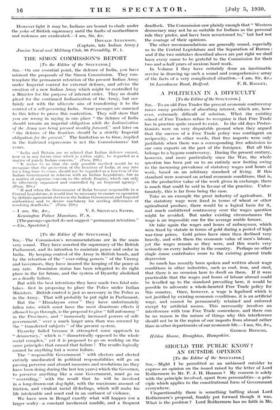A POLITICIAN IN A DIFFICULTY
[To the Editor of the SPECTATOR.]
San,—To an old Free Trader the present economic controversy raises many problems of absorbing interest, which are, how- ever, extremely difficult of solution. What the existing school of Free Traders refuse to recognize is that Free Trade has in practice quite ceased to exist. In the old days Protec- tionists were on very disputable ground when they argued that the success of a Free Trade policy was contingent on recipmeity, or in other words, that free imports were only justifiable when there was a corresponding free admission to our own exports on the part of the foreigner. But all this belongs to a bygone controversy. During the present century, however, and more particularly since the War, the whole question has been put on to an entirely new footing owing to the increasing prevalence of statutory wages and hours of work, based on an arbitrary standard of living. If this standard were assessed on actual economic conditions, that is, on the productive value of the work given in exchange, there is much that could be said in favour of the practice. Unfor- tunately, this is far front being the case.
Take as an example the great industry of agriculture. If the statutory wage were fixed in terms of wheat or other agricultural produce, there would be a logical basis for it, and much embittered controversy over the wages question might be avoided. But under existing circumstances the wage is an impossible one for the average arable farmer.
Or take again the wages and hours of railwaymen, which were fixed by statute in terms of gold during a period of high war-time prices. Gold prices have since then declined very heavily, and with them the economic value of men's labour, yet the wages remain as they were, and this reacts very seriously on every industry in the country. Perhaps no other single cause contributes more to the existing general trade depression
So much has recently been spoken and written about wage conditions in other industries, such as coal, iron, and steel, that there is no occasion here to dwell on them. If it were practicable that the wages and hours of labour abroad could be levelled up to the standard prevailing here, it would be possible to advocate a whole-hearted-Free Trade policy for this country. Once, however, a wage is legalized which is not justified by existing economic conditions, it is an artificial wage, and cannot be permanently retained and enforced except by artificial means. This necessarily involves an interference with true Free Trade somewhere, and there can be no reason in the nature of things why this interference should not be in the region of our imports from abroad rather than in other departments of our economic life.—I am, Sir, &c.,
GEORGE BRISCOE.
Ilildon House, Broughton, Hampshire.










































 Previous page
Previous page